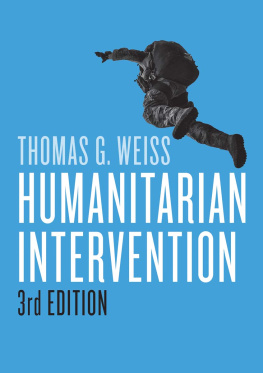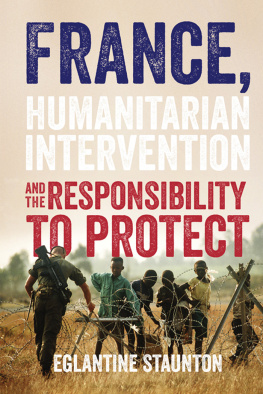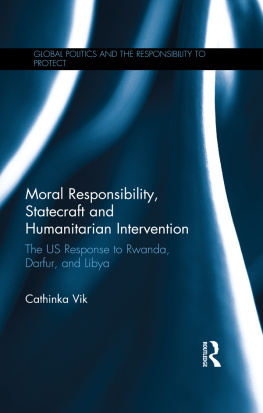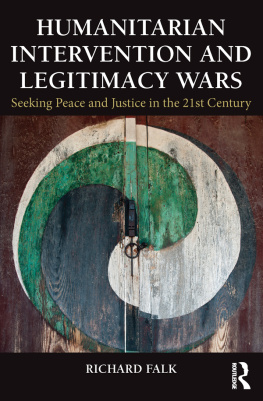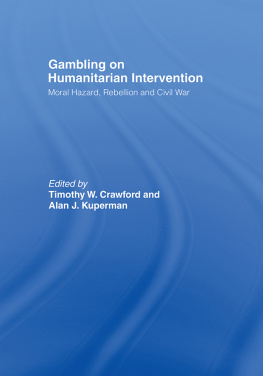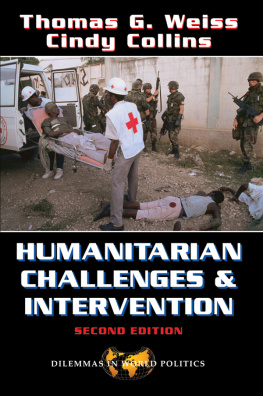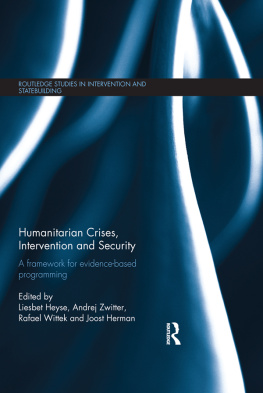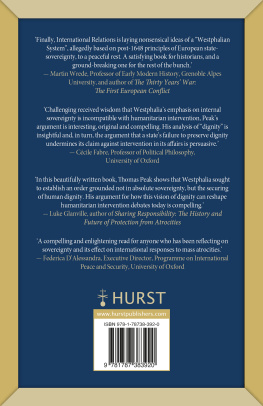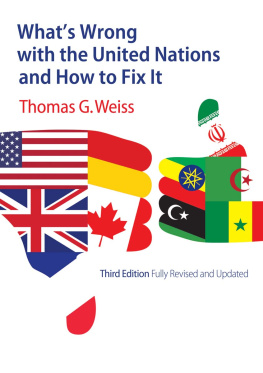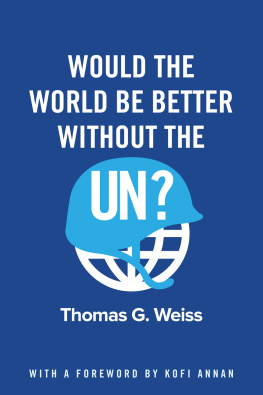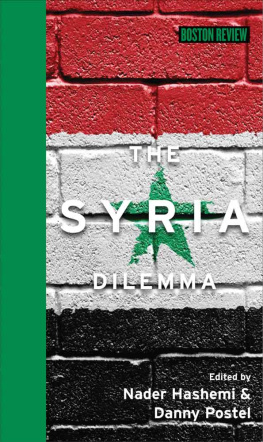Weiss Thomas G. - Humanitarian Intervention (War and Conflict in the Modern World)
Here you can read online Weiss Thomas G. - Humanitarian Intervention (War and Conflict in the Modern World) full text of the book (entire story) in english for free. Download pdf and epub, get meaning, cover and reviews about this ebook. year: 2016, genre: Politics. Description of the work, (preface) as well as reviews are available. Best literature library LitArk.com created for fans of good reading and offers a wide selection of genres:
Romance novel
Science fiction
Adventure
Detective
Science
History
Home and family
Prose
Art
Politics
Computer
Non-fiction
Religion
Business
Children
Humor
Choose a favorite category and find really read worthwhile books. Enjoy immersion in the world of imagination, feel the emotions of the characters or learn something new for yourself, make an fascinating discovery.
- Book:Humanitarian Intervention (War and Conflict in the Modern World)
- Author:
- Genre:
- Year:2016
- Rating:3 / 5
- Favourites:Add to favourites
- Your mark:
- 60
- 1
- 2
- 3
- 4
- 5
Humanitarian Intervention (War and Conflict in the Modern World): summary, description and annotation
We offer to read an annotation, description, summary or preface (depends on what the author of the book "Humanitarian Intervention (War and Conflict in the Modern World)" wrote himself). If you haven't found the necessary information about the book — write in the comments, we will try to find it.
Humanitarian Intervention (War and Conflict in the Modern World) — read online for free the complete book (whole text) full work
Below is the text of the book, divided by pages. System saving the place of the last page read, allows you to conveniently read the book "Humanitarian Intervention (War and Conflict in the Modern World)" online for free, without having to search again every time where you left off. Put a bookmark, and you can go to the page where you finished reading at any time.
Font size:
Interval:
Bookmark:

War and Conflict in the Modern World Series
Alexandru Balas & Paul Diehl, Peace Operations 2nd edition
L. Brock, H. Holm, G. Srensen & M. Stohl, Fragile States
Feargal Cochrane, Ending Wars
Matthew Evangelista, Law, Ethics and the War Terror
J. Michael Greig & Paul F. Diehl, International Mediation
John Kaag & Sarah Kreps, Drone Warfare
Janie Leatherman, Sexual Violence and Armed Conflict
Andrew Mumford, Proxy Warfare
Dennis Sandole, Peacebuilding
Eric Shibuya, Demobilizing Irregular Forces
Timothy Sisk, Statebuilding
Rachel Stohl & Suzette Grillot, The International Arms Trade
Paul Viotti, American Foreign Policy
I. William Zartman, Preventing Deadly Conflict
THIRD EDITION
THOMAS G. WEISS
polity
Copyright Thomas G. Weiss 2016
The right of Thomas G. Weiss to be identified as Author of this Work has been asserted in accordance with the UK Copyright, Designs and Patents Act 1988.
First edition published in 2007 by Polity Press
This edition published in 2016 by Polity Press
Polity Press
65 Bridge Street
Cambridge CB2 1UR, UK
Polity Press
350 Main Street
Malden, MA 02148, USA
All rights reserved. Except for the quotation of short passages for the purpose of criticism and review, no part of this publication may be reproduced, stored in a retrieval system, or transmitted, in any form or by any means, electronic, mechanical, photocopying, recording or otherwise, without the prior permission of the publisher.
ISBN-13: 978-1-5095-0735-1
A catalogue record for this book is available from the British Library.
Library of Congress Cataloging-in-Publication Data
Weiss, Thomas G. (Thomas George), 1946
Humanitarian intervention / Thomas G. Weiss. -- Third edition.
pages cm
Includes bibliographical references and index.
ISBN 978-1-5095-0731-3 (hardback) -- ISBN 978-1-5095-0732-0 (paperback) 1.
Humanitarian intervention. I. Title.
JZ6369.W448 2016
341.584--dc23
2015031612
The publisher has used its best endeavours to ensure that the URLs for external websites referred to in this book are correct and active at the time of going to press. However, the publisher has no responsibility for the websites and can make no guarantee that a site will remain live or that the content is or will remain appropriate.
Every effort has been made to trace all copyright holders, but if any have been inadvertently overlooked the publisher will be pleased to include any necessary credits in any subsequent reprint or edition.
For further information on Polity, visit our website: www.politybooks.com
Thomas G. Weiss is Presidential Professor of Political Science at The Graduate Center of The City University of New York (CUNY) and director emeritus of the Ralph Bunche Institute for International Studies. Past President of the International Studies Association and recipient of its Distinguished IO Scholar Award 2016, he was also editor of Global Governance and research director of the International Commission on Intervention and State Sovereignty as well as Chair of the Academic Council on the UN System. He has written extensively about international organization, peace and security, humanitarian action, and sustainable development. Recently authored books include Whats Wrong with the United Nations and How to Fix It, 3rd edn (2016); The United Nations and Changing World Politics, 8th edn (with David P. Forsythe, Roger A. Coate, and Kelly-Kate Pease, 2016); Governing the World? Addressing Problems without Passports (2014); Global Governance: Why? What? Whither? (2013); Humanitarian Business (2013); Humanitarianism Contested: Where Angels Fear to Tread (with Michael Barnett, 2011); Thinking about Global Governance: Why People and Ideas Matter (2011); Global Governance and the UN: An Unfinished Journey (with Ramesh Thakur, 2010); and UN Ideas That Changed the World (with Richard Jolly and Louis Emmerij, 2009). Recently edited volumes include Emerging Powers and the UN: What Kind of Development Partnership? (with Adriana Erthal Abdenur, 2015); Wartime Origins and the Future UnitedNations (with Dan Plesch, 2015); International Organization and Global Governance (with Rorden Wilkinson, 2014); Post-2015 UN Development: Making Change Happen? (with Stephen Browne, 2014); The International Politics of Human Rights: Rallying to the R2P Cause? (with Mnica Serrano, 2014); and The Responsibility to Protect: Cultural Perspectives in the Global South (with Rama Mani, 2011).
Mass murder and ethnic cleansing of the kind the world witnessed in Rwanda and the Balkans in the 1990s, and has seen again in this new century in Darfur, Sri Lanka, Libya, and Syria shock the conscience like nothing else. The shock is compounded when we think about how much the international community has known since the Holocaust and Cambodia as to how these catastrophes begin and gather momentum, and how readily so many of them could have been averted. But every few years we found ourselves, humbled and shamefaced, acknowledging once again that such a catastrophe has occurred and pledging not to allow anything like it ever to be repeated.
Professor Thomas G. Weiss, in his writings over many years, is one of those who have made it impossible for the international community to claim that these situations are unforeseeable or irremediable. Many academics and journalists and think-tanks have analyzed their dynamics, making clear what needs to be done, who needs to do it, and the many constraints that stand in the way of effective action. But few have been as well versed in the issues and as articulate as the author of this book. Few have brought to the task such knowledge of the relevant global history, and such a clear understanding of the normative principles involved and how they can be made to work in international institutional practice.
Humanitarian Intervention now updated and expanded in this timely third edition is pitched not only for students of international affairs, but for attentive citizens who want a clear and readable guide to how this great moral and political challenge of our time has repeatedly been fumbled by the worlds leaders, how those leaders can and should do better, and how in recent years they have been showing at last some signs of doing just that. But above all, it is written for, and should be read by, those very policymakers who have so often sat on the sidelines wringing their hands and making excuses as genocide, ethnic cleansing, and other major crimes against humanity have been screened in slow motion before them.
The good news, for more than a decade now, is that policymakers are no longer operating, as they did for so long, in an almost principle-free and consensus-free vacuum, in which no one could agree what, if any, limits there were on a sovereign states freedom of action when it came to internal matters not immediately threatening a neighbors or the wider worlds security, and where there was particularly acute disagreement about when and where it was ever right to use coercive military force. In 2005, the more than 150 national leaders attending the World Summit to commemorate the sixtieth anniversary of the United Nations unanimously agreed that there is a principle which explains and justifies engagement and concern, and in extreme cases forcible intervention.
Font size:
Interval:
Bookmark:
Similar books «Humanitarian Intervention (War and Conflict in the Modern World)»
Look at similar books to Humanitarian Intervention (War and Conflict in the Modern World). We have selected literature similar in name and meaning in the hope of providing readers with more options to find new, interesting, not yet read works.
Discussion, reviews of the book Humanitarian Intervention (War and Conflict in the Modern World) and just readers' own opinions. Leave your comments, write what you think about the work, its meaning or the main characters. Specify what exactly you liked and what you didn't like, and why you think so.

